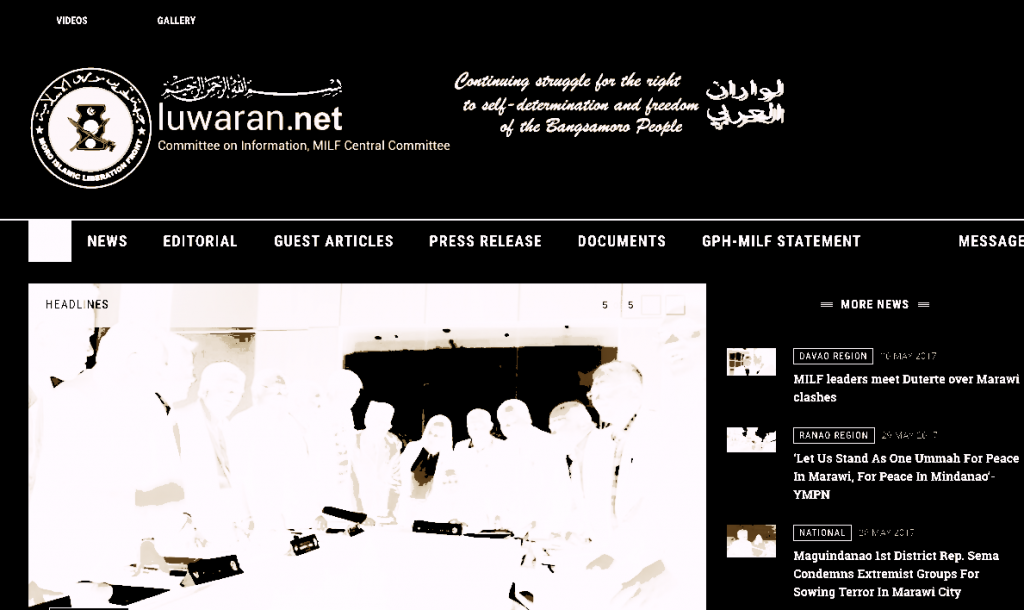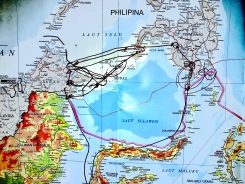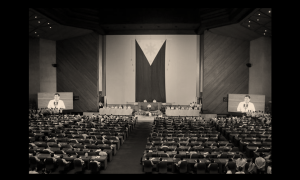Since the Battle of Marawi in 2017, security experts have once again turned their attention to the Philippines. There have been efforts to profile the Maute group from their ideological positions, political goals, and regional networks.
Sometimes, this comes at the expense of examining other groups that provide a different narrative to the conflict in Southern Philippines. One of these groups is the Moro Islamic Liberation Front (MILF).
The MILF once used Islamic tradition to empower its militant, anti-government discourse. In the past seven years, however, it has been a party to peace negotiations with the Philippine government.
Consequently, the MILF is forced to walk a tightrope between two extremes. On one hand, the MILF must commit to the peace negotiations, in light of the reprieve it gives to its constituents. On the other hand, the MILF must maintain its legitimacy amidst other, more violent, rebel groups claiming to liberate the Moro people.
The MILF’s online content reveals how the MILF navigates this dilemma. The religio-moral impetus offered by an Islamic vocabulary allows the MILF to legitimise itself and condemn those that stand against it.
In this case, it has eventuated in an Islam animating the MILF’s calls for moderation rather than enlivening a renewed push for violent resistance, contrasting from other rebel competitors in Mindanao. It fosters a specifically Moro sense of socio-economic justice, achieved preferably through civic or non-violent means.
Enjoining what is right and forbidding what is wrong
The phrase, derived from the Qu’anic al-amr bi-l-ma’ruf wa-nahy ‘an al-munkar, is a central edict of Islam’s holiest text, providing the basic parameters for leading an Islamic life in the world. It is also key for understanding the religion from a conceptual standpoint.
Talal Asad speaks of “Islamic traditions” rather than a singular “Islam” per se, wherein the religion is understood as a cumulative body of interpretations accruing over time and context. In that process, it becomes inevitable that such Islamic traditions are sustained, assailed, and suppressed in continuous contestation over who holds the correct interpretation of Islam, and who has gotten it wrong.
It is of little surprise, then, that the MILF is eager to condemn its radical rivals and uphold the virtues of its own work. What proves striking is its fixation on conciliatory, rather than armed, measures. For instance, a May 2016 MILF editorial posted to Luwaran.net in condemnation of the beheading of Canadian citizen John Ridsdel states:
We join the families and friends of the victim in their hour of bereavement and grief… we appeal to [Abu Sayyaf Group, or ASG] to return to the legitimate way of asserting our right to self-determination. Kidnapping will never lead anyone to nowhere [sic].
In another editorial the following year, the MILF writer used specific doctrinal references to abhor violent radicalism—three Qur’anic verses condemning the killing of innocents, and one hadith from Sahih Bukhari forbidding belief in religious extremes. They reference the Qur’an 2:190 in particular, which permits violence against an aggressor, but specifically commands that one “not exceed the limits.”
The Bangsamoro Islamic Freedom Fighters (BIFF), partly implicated in the Marawi crisis, also did not escape the MILF editorials’ ire for the same reasons. Responding to civilian deaths during BIFF offensives in Maguindanao, the majority of whom were Christian, the writer laments:
Great God, this is against the teachings of Islam. A Muslim should only fight the one who fights him; and children, women, and the elderly should be spared. There is no terrorism in jihad or a threat to civilians.
If the MILF’s dedication to the peaceful establishment of a Bangsamoro entity was not yet clear, the editorial goes on to lay some of the blame on the Philippine Congress for delaying the passage of the Bangsamoro Basic Law (BBL, passed earlier this year). Put dramatically, “in the heels of the non-passage of the proposed Bangsamoro Basic Law (BBL) in Congress, the radicals are laughing to their hearts full.”
In the MILF’s online representations, at the very least, the MILF departs from stringent jihadi Islamic traditions.
Initially, scholars like Eliseo Mercado, Nathan Gilbert Quimpo (see Quimpo’s and Mercado’s chapters in The US and the War on Terror in the Philippines, co-edited with Patricio Abinales), and Marjanie Macasalong traced the MILF’s ideological inspirations to the exclusivist scholars Sayyid Qutb and Abul A’la Mawdudi. While they perhaps cannot be blamed too much, as an early interview with MILF founder Salamat Hashim establishes the same connection, a reappraisal considering the MILF’s moderation is necessary.
Qutb and Mawdudi were known for dichotomising the world into strict Islamic and non-Islamic realms. They posture quite aggressively against any semblance of a non-Islamic system as a form of “forward defence” for the faith, however radically interpreted.
Jihad, or struggle (even violently), for the two thinkers was the only way to defend Islam from non-Islamic oppression. The moderate discourse of MILF ideologues in recent times—frequently referring to the necessity of peace talks with a largely non-Islamic Government and intolerant of other Islamic groups that continue to advocate for violent rebellion—departs from the narrow jihadism of Qutb and Mawdudi.
To be sure, the MILF still frames its religio-political action in a liberationist tenor. It does not abandon the premise that all peace negotiations (and any other action taken by the MILF) are for the supreme goal of freeing the Bangsamoro from historical oppression. The narrative of persecution by the Philippine political centre persists to this day, and in 2012, chairman Murad Ebrahim stated plainly before a national audience that the Moro have suffered an:
expropriation of our sovereignty as a free Moro Nation and consequently our relegation into a state of captivity that eradicated our Bangsamoro identity and reduced our ancestral homeland into small parcels of gerrymandered territories…
The anti-oppression vigour of the jihadi tradition remains. MILF discourse, however, presents a distinctly Moro innovation of this oppositional interpretation of Islam that centres on social justice. The MILF, at least in online self-presentation, follows a jihadi line more akin to the relatively cosmopolitan thought of Tunisian thinker Rachid al-Ghannouchi and parts of the theologising of Egyptian Islamist Yusuf al-Qaradawi (however inconsistent he may be criticised for being). Struggle against injustice is still sanctified, but violence is only justified in explicitly defensive terms for these scholars.
Terrorist arbitrage in Southeast Asia
Jihadists know how to take advantage of the unique space for mobilisation offered by the Indonesia–Malaysia–Philippines triborder area. Governments are still catching up.
The Luwaran.net editorials are not the only discursive outlet available to the MILF, however. Luwaran news reports also tend to follow the tenor of the editorials, as the second part of this article will show. Most importantly, they conjure a world for the reader where the MILF’s touted non-violent activism has a leading role.
 Facebook
Facebook  Twitter
Twitter  Soundcloud
Soundcloud  Youtube
Youtube  Rss
Rss 



